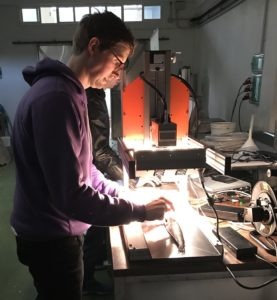Maersk, the world’s largest transporter of food, has made a strategic investment in ImpactVision, a software company using hyperspectral imaging and machine learning to rapidly assess food quality. ImpactVision is an AgFunder portfolio company.
Agrifood tech accelerator group The Yield Lab also joined as a new investor, while existing investors Acre Venture Partners, AgFunder, and Xandex Ventures made follow-on investments.
Maersk and ImpactVision
Peter Jorgensen, venture partner at Maersk Growth is excited about the potential for ImpactVision to help combat food waste as well as food quality and safety in its supply chains.
“Hyperspectral imaging technology is a gamechanger for the food system and ImpactVision’s machine-learning first approach positions them competitively as the sensors increasingly commoditize,” he said. “We see clear potential in enabling food supply chains to be more predictive, in terms of waste reduction but also increasing quality and safety for consumers worldwide.”
Jorgensen added that there are many different departments of Maersk that will look forward to working with ImpactVision.
“We ship around 30% of all refrigerated containers globally and we have a clear desire to develop more transparency across the supply chain, which could, for example, be about freshness and shelf life of the transported produce. In conjunction with existing Maersk solutions like RCM, we see opportunities for an improved understanding of how for instance the produce is impacted during transport and which could lead to better cargo damage prediction. So several departments and colleagues within Maersk will look forward to exploring opportunities with IV,” he added.
The investment will be used to accelerate product development and grow ImpactVision’s engineering and sales teams.
“We are thrilled to have Maersk join us in this financing round, and look forward to benefiting from their global reach and deep experience in logistics and food supply chains,” said ImpactVision CEO, Abi Ramanan.
ImpactVision: Hardware & Software
ImpactVision’s system is a package combining hardware (a camera) that collects hyperspectral images and machine learning software. The hardware is mounted above a conveyor belt in food processing facilities in order to capture images of products in real time, as they pass below. The startup’s software models then analyze those images to provide insights about the quality of the product instantly and non-invasively.

The information it provides allows food companies to make decisions about how products should be packed, sorted and distributed based on quality attributes such as the freshness of fish, the ripeness of avocados, the presence of foreign objects and even contamination.
By accessing this data earlier in the supply chain, food companies are able to deliver more consistent quality, generate premium products, maximize yields, and prevent supply chain waste.
“Hyperspectral imaging allows us to perceive qualities the human eye cannot detect by accessing information from across the electromagnetic spectrum – for example, the freshness or ripeness of food products. We recognize the potential this data has to transform the way supply chains process and distribute food,” said Ramanan.
What is Hyperspectral Imaging Technology?
Hyperspectral imaging technology captures information from across the electromagnetic spectrum rather than only the visible light portion, which the human eye can see. Hyperspectral images combine the power of digital imaging with the chemical technique called spectroscopy. Differing objects reflect light in a specific way, generating unique spectral signatures which represent particular
food characteristics.
ImpactVision is building a library of these signatures to enable food businesses to more accurately identify products and predict their quality attributes during processing.
“Five years ago the cost of hyper-spectral was so high it would have been unfeasible to even start this company. As the costs of the enabling technology continue to come down ImpactVision could become standard issue in every food processing line,” said Rob Leclerc founding partner at AgFunder.
First Commercial Product Launching this Month
This month, ImpactVision installed its first commercial system to detect foreign objects in sugar for Beta San Miguel, Mexico’s largest sugar processor. Because of its ability to capture spectral information, ImpactVision’s in-line system is able to identify foreign objects often missed by metal detectors, X-ray, and manual visual inspection.
“ImpactVision’s foreign object detection system gives us full confidence that potential contaminants will be detected in real-time during processing,” said Ismael Santiago Aguirre, director of Special Projects and Innovation at Beta San Miguel. “This means we can always guarantee premium quality sugar to our clients, enhancing our brand and product.”
Over the last two years, ImpactVision has also developed applications for predicting quality attributes of meat, fish, fruit, and salad through successful pilots in partnership with a number of global food companies. These include applications for predicting avocado ripeness, classifying the freshness and species of fish, and automating the shelf-life prediction of produce items, such as salad.
ImpactVision recently won a competition to work with the suppliers to the UK largest retailer Tesco, which has committed to reduce waste by 50% by 2030. ImpactVision was also recognized by Unilever through the Young Entrepreneurs Awards as well as MIT’s Innovators Under 35 Awards.
Image: ImpactVision





